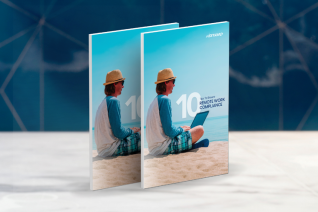Establish your presence globally with Neeyamo as we help you go beyond borders to manage your international payroll and hire new talent in Nigeria.
Overview
Nigeria is a country in West Africa; it shares land borders with the Republic of Benin to the west, Chad and Cameroon to the east, and Niger to the north. The prominent industries in the country are Industrial and Consumer Goods, Technology, Media, and Telecommunication, Healthcare, Power & Utilities, Financial Services, Agriculture, and Oil & Gas.
Neeyamo provides assistance for onboarding and managing employees in Nicaragua, along with processing a firm's payroll, compliance, benefits, and more.
Tools And Instances
Facts And Stats
Capital
Abuja
Currency
Nigerian Naira
Official Language
English
Fiscal Year
1 January - 31 December
Date Format
DD/MM/YYYY
Country Calling Code
234
Other Languages
Hausa, Igbo, Yoruba
Time Zone
West Africa Standard Time: (GMT +01:00)
Global Payroll
Overview
What is Payroll?
Payroll is the list of compensation to be paid to employees of a company or organization for a set period or date.
What is Global Payroll?
Global payroll is the management of the entire payroll function of an organization across all countries of operation. Organizations use a single solution capable of doing this from one central location.
Handling payroll for a widespread workforce can pose a significant challenge for any organization, and the added complication of compliance can make things worse. If companies spend more time processing payroll, it directly impacts day-to-day operations and their overall productivity.
Over the years, Neeyamo has observed these complexities and strived to provide a global payroll solution through a single technology platform - Neeyamo Payroll
How is payroll calculated?
Neeyamo acts as your personalized Payroll Calculator. Ensuring adherence to local regulatory requirements using multi-level controls. Providing timely and accurate payroll, courtesy of our experts worldwide and using a tech-based integrated smart helpdesk solution with seamless support experience manned by payroll experts - Neeyamo has all your payroll needs covered.
What is a Global Cash Card?
A "Global Cash Card" commonly denotes a prepaid debit card or payroll card given by employers to their staff, serving as an alternative way to disburse salaries and various types of remuneration.
Payroll Taxes
Payroll tax is the percentage amount retained from an employee's salary and paid to the government to invest in the general population's welfare. These are statutory in nature and are levied from both the employer and employee. Additional statutory contributions are made by employers towards aiding both short-term and long-term benefits for their employees.
Employee Taxes
All employees must contribute 8% towards pension. Employees who earn more than 3,000 NGN per year must also contribute 2.5% towards Housing Fund.
The employee income tax bracket is as follows:
| 0 - 300,000 NGN | 7% |
| 300,001 NGN - 600,000 NGN | 11% |
| 600,001 NGN – 1,100,000 NGN | 15% |
| 1,100,001 NGN - 1,600,000 NGN | 19% |
| 1,600,001 NGN - 3,200,000 NGN | 21% |
| Above 3.2 million NGN | 24% |
With effect from 1 May, 2023, the change in Personal Income Tax Act (PITA) is the premium paid in respect of insurance on own life and spouse.
Employer Taxes
Employers make the following payroll contributions:
- Pension (applicable to employers with more than fifteen employees) - 10%
- Industrial Training Fund (ITF) (applicable to all employers with a minimum of five employees or annual turnover of 50 million NGN) - 1%
- Total employer contributions - 1 to 12%
Payroll Cycle
Overview
Undoubtedly, payroll is a critical process for any organization. The pay cycle in Nigeria refers to the period for which an organization pays its employees, and this can vary depending on the pay frequency that the organization chooses to adopt.
Frequency
In Nigeria, the payroll frequency is monthly, bi-weekly, or weekly. The payment for salaries is to be made at least once a month.
13th Month Cycle
There are no statutory requirements for 13th-month salary payments. However, bonuses are common at the discretion of the employer.
Global Work
Overview
An Employer of Record (EOR) service provider helps you eliminate the hassle of handling complexities while onboarding a new employee in an international location. They help bridge the gap that otherwise mandates organizations to have a local registered entity and a local bank account, prior to making a job offer to an international hire.
An EOR service provider acts as a legal employer, facilitates salary payments, and manages other statutory requirements such as health insurance, payroll taxes, and employee benefits, ensuring compliance with local tax laws and regulations.
This allows organizations to focus on collaborating with the employee in Nigeria for operational tasks, with the knowledge that they have a cost-effective solution to support their global payroll & HR requirements as they continue their global expansion.
HR Mandates and Practices
Minimum Wage
The Nigerian government has announced an upcoming revision to the national minimum wage, effective April 1, 2024. While the specific salary amount has not yet been finalized, the existing minimum wage of N 30,000 will expire on March 31, 2024.
Key Points:
- Current Minimum Wage: N 30000 (effective until March 31, 2024)
- Revised Minimum Wage: Effective April 1, 2024 (specific amount to be determined)
Overtime
Overtime means any hours worked in excess of regular work hours as defined by the employment contract or a collective bargaining agreement. The Labor Act does not address wage rates for overtime.
Data Retention Policy
Employers must maintain a record of all wages paid, tax deduction cards, vouchers, and other documents and records relating to salary payments and income taxes withheld. This record must be maintained on the employer's premises.
The statute of limitations on income tax liabilities is six years.
Contributory Pension Scheme: Employers must maintain a record of books, accounts, documents, vouchers, information, and explanations relating to RSA contributions and must make them available to examiners upon request.
National Housing Fund: Employers must maintain a record of books, accounts, and documents regarding contributions to the fund and must make them available to the FMBN upon request.
Employees' Compensation Fund: Employers must maintain an accurate account of all remuneration paid to their employees and other details of their operations.
Hiring and Onboarding Requirements
Hiring
Law provisions under the Labour Act and the Nigerian Constitution prohibit discrimination of all forms in employment.
However, there are no legal requirements under Nigerian law that give preference to hiring particular groups of people. These provisions are more applicable to federal employment and appointments that stipulate that the principle of federal character be applied to ensure that appointments to public service institutions (exclusively) fairly reflect the linguistic, ethnic, religious, and geographical diversity of the country.
Onboarding
Local employees must give the following information during onboarding:
- Personal information (Name, Address, DOB)
- Copy of valid national ID/ Passport
- CV and Cover Letter
- Educational qualification certificate
- Past employment information
- Bank account details for payroll
- Social security records
- Criminal record attestation
- Medical certificate
- Employee resignation letter from previous employment
- Emergency contact information
Additionally, expat employees must submit the following documents:
- Copy of the employee's CV and relevant educational qualifications
- Proof of expatriate quota approval
- Applicant passport with STR visa endorsement
- Nigerian Work Permit
Probation
Probation periods are outlined in the employee’s employment contract/collective agreement; there is no legal requirement for a probation period.
Leave
National Holidays
The following public holidays are observed in Nigeria:
- 1 Jan Jan. 1 and Jan. 2: New Year's Day
- Apr 7: Good Friday
- Apr 10: Easter Monday
- Apr 22 and Apr. 23: Id el Fitr
- May 1: Workers' Day
- Jun 12: Democracy Day
- Jun 29 and Jun. 30: Id el Kabir
- Sep 27: Id el Maulud
- Oct 1: National Day
- Oct 2: Day off for National Day
- Dec 25: Christmas Day
- Dec 26: Boxing Day
Annual Leave
Employees are entitled to annual leave of at least six working days at full pay after 12 months of continuous service.
A worker under 16 years of age, including an apprentice, is entitled to at least 12 working days of annual leave at full pay.
The employee and the employer may agree to defer accrued annual leave for up to 24 months, but an employer may not pay wages in lieu of annual leave.
Sick Leave
Sec 6, According to the Workmen's Compensation Act, a worker is entitled to be paid for up to twelve working days of absence from work in any one calendar year due to temporary illness certified by a registered medical practitioner:
However, this section shall not apply unless:
- the contract continues to exist during the absence, and the employee is ready and willing to perform his part of the contract except for the incapacity caused by the illness; and
- the worker agrees to be examined by a qualified medical practitioner selected by the employer if so requested.
Maternity Leave
Sec 54, A pregnant employee is entitled to 12 weeks of maternity leave beginning six weeks before her due date. If she has worked for the employer for six months or more before the start of her maternity leave, the employer is required to pay her 50% of her regular wages during maternity leave.
The employee is not allowed to work for six weeks after giving birth to her child. After returning to work, the employee is given 30 minutes twice a day to nurse or feed her child.
An employer may not dismiss a worker who is on maternity leave.
Paternity Leave
There is no statutory provision for paternity leave.
Termination
Notice Period
Before terminating an employment relationship, employers and employees must provide notice as follows:
- one day's notice for contracts of fewer than three months;
- one week's notice for contracts of more than three months and less than two years;
- two week's notice for contracts of more than two years but less than five years; and
- one month's notice for contracts of five years or more.
Severance Pay
Severance pay is outlined in the employees’ employment contract/collective agreement; there is no legal obligation to pay any severance.
Visa
Overview
Foreign workers must obtain a temporary work permit (TWP) or a subject to regularization (STR) visa and a combined expatriate residence permit and aliens card (CERPAC). Temporary work permits generally are granted to experts invited by corporate bodies to provide specialized skilled services. Employers should submit TWP applications for their employees on the Nigerian Immigration website. A TWP is a single-entry visa valid for three months.
A CERPAC may be granted to expatriate residents working in Nigeria and is valid for two years. To apply for a CERPAC, foreign workers must submit a letter from their prospective employer in which their employer sponsors them for regularization of stay and accepts immigration responsibility on their behalf. Additionally, foreign workers must submit a letter of appointment and an offer letter. Foreign workers who obtain a CERPAC also must apply for and obtain an STR visa.
Residents of the Economic Community of West African States (ECOWAS) may enter Nigeria without a visa. They also are entitled to a residence card valid for five years without receiving the special permission required of residents of other countries.
Employee Background Checks
Legal and Background Checks
There are no restrictions against background checks on applicants. However, this is subject to section 37 of the Nigerian Constitution, which guarantees a right to privacy for citizens, their correspondence, telephone conversations, and telegraphic communication.
Last updated on August 21, 2023
If you have any queries or suggestions, reach out to us at irene.jones@neeyamo.com
¿Tiene consultas? Póngase en contacto con nosotros
Póngase en contacto con uno de nuestros expertos y obtenga una demostración rápida de nuestros servicios







